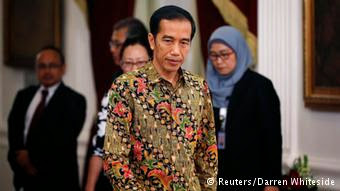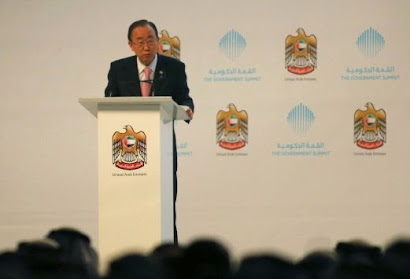 |
A more democratic United Nations was on the agenda of the Bali Democracy
Forum attended by leaders such as Indonesian President Susilo Bambang
Yudhoyono, Australian Prime Minister Julia Gillard, Afghan President Hamid Karzai
and Turkish Prime Minister Recep Tayyip Erdogan. (AFP Photo/Sonny Tumbelaka) |
Related
articles
The issue
of reforming the United Nations Security Council loomed large during the
two-day Bali Democracy Forum, which was attended by 11 heads of state and
government.
The essence
of their speeches on this particular topic was to restructure the council, or
UNSC, to the extent that it represents “actual realities” of the present-day
global constellation so that the world’s most powerful authority is not
“undemocratically controlled” only by the five permanent members, often
referred to as the “Perm Five.”
Turkish
Prime Minister Recep Tayyip Erdogan recognized that the current constellation
of the UNSC was the result of a global power imbalance in the aftermath of
World War II. Now that this reason is out-dated, he said, it is time for the
council to be restructured.
Afghan
President Hamid Karzai also spoke about the need to overhaul the UN system and
make it more democratic because the current constellation is “no longer
suitable” for present-day realities.
Indonesian
President Susilo Bambang Yudhoyono gave a broader perspective on the issue and
emphasized the need to democratize the United Nations to the point that it
reflects the globe’s potential strengths in all fields. This would include
rewriting the criteria for membership to the UNSC.
To do so, the
UN Charter must be amended. And that is where huge problems arise. If amending
a country’s constitution is a big and very sensitive issue, more so is the
proposition to amend the UN Charter.
Where to
begin? Who will have the authority to conduct reform? And, the most crucial
question is, how to get the United States, Russia, China, Britain and France to
agree to relinquish their exclusive veto rights? These states would then no
longer enjoy the exclusivity of such rights and be “downgraded” to the level of
ordinary, non-permanent members. Reforming the UNSC would mean scrapping
exclusive rights and sharing them with the rest of the UNSC members.
What the
Bali Democracy Forum leaders had in mind was that if the UNSC could be
reformed, it should begin by abolishing the distinction between permanent and
non-permanent membership, thereby sharing the exclusive veto right equally
among all members as a matter of democratic fairness.
The next
step would be to rewrite the criteria for obtaining UNSC membership status.
That should
reflect the real strength of the world, from economic to socio-demographic,
technological, geo-strategic and soft-power excellence, and not merely based on
perception of a country’s military strength, which is how it has been done for
nearly seven decades.
Idealistically,
that would usher in a more balanced global order in which key decisions on
global peace, security, governance and economic policy formulation are made
democratically by a reformed UN whose resolutions would no longer be suspected
of advancing or siding with the agendas of certain countries.
In step
with such endeavors, the UN General Assembly must be given greater authority to
establish a “democratic superbody” under its auspices with the mandate to
appoint the right people to lead various international agencies such as the
World Bank, International Monetary Fund and all UN organs.
The conduct
of the assembly, or UNGA, itself needs to be reformed so that it no longer
becomes a forum for adversaries to attack each other, as in the ugly annual
shows by warring countries, or those involved in various kinds of undeclared,
yet open, war.
Delegates
to UNGA should be required to present their best practices so others can learn
from and their concerns and propose solutions to global problems affecting
their existence.
That way,
the UNGA could become an annual forum for obtaining answers and solutions
instead of a platform for displaying hegemony, hatred, provocation and enmity.
What a wonderful world the final outcome would be! In fact, US President Barack
Obama has for some time envisaged such a UN. But for now, these reforms remain
in my daydreams after reading the speeches of the Bali Democracy Forum leaders.
The
speeches taught me to dream about a new world in which the UN is the peacemaker
and problem-solver for its member countries. I was taught by those speeches to
smile optimistically at future harmonious international relations, rather than
frowning at the current realities.
But after a
while, I realized that none of what those leaders were saying about UN reform
during the forum was actually new.
Even as
early as 1992, when leaders of the Non-Aligned Movement (NAM) gathered for
their 10th summit in Jakarta, they had already issued a joint declaration that
aimed to, among other things, reform the UN.
Even before
that, Ali Alatas, who served as Indonesia’s foreign minister from 1988 to 1999
and was very well respected for his diplomatic acumen, strove through various
international forums to achieve a consensus for reforming the UN.
Alatas —
who co-chaired the Paris International Peace Conference on Cambodia with
then-French Foreign Minister Roland Dumas and was the spokesman of the Third
World Group of 77 for talks with advanced countries — used Asean, the Group of
77, NAM, the Organization of the Islamic Conference (OIC) and other forums to
advance this goal. And yet untilhis death, he had not seen his painstaking
efforts come to fruition.
The global
power constellation remains undemocratic despite the rhetoric of those
self-proclaimed “champions of democracy.” It is a big illusion to expect the
Bali Democracy Forum to correct the situation by relying on its own network.
BDF needs
to be expanded to include the United States, Russia, China, Britain and France
as permanent participants, as well as other regional powers such as Brazil and
Mexico to represent South America; South Africa, Egypt and perhaps Nigeria or
other strong economies on the African continent; as well as Germany, Canada and
OIC members.
Besides,
leaving NATO members out of the picture would be counterproductive — if indeed
reforming the UNSC is part of the goal that BDF leaders had in mind during
their Bali meeting. The time is right because NATO does not have an enemy today
to justify its huge weaponry.
Before
talking about reforming the UN what BDF must do is strengthen its membership
network to represent the actual strength of international constellations so
that its aspirations can be supported by those participants that represent the
majority of global strength.
But that
alone is not enough. How the BDF can amend the UN Charter and reform the UN is
a wilderness that has yet to be explored.
Perhaps it
will remain in my daydreams for many more years until I give up and acknowledge
that this is not simple work that can be solved through a loose forum’s appeals
and declarations.
The world
needs a new democratic conscience movement to push such strategic issues
forward. And it needs great statesmen to make it happen.
The next
BDF needs to go a lot further than just a collection of keynote speeches. The
forum must attract other centers of power so that they too may lend a helping
hand in creating a more balanced global order.
Pitan Daslani
is a senior political correspondent at BeritaSatu Media Holdings, of which the
Jakarta Globe is a subsidiary. He can be reached at
pitandaslani@gmail.com
Related Articles:













